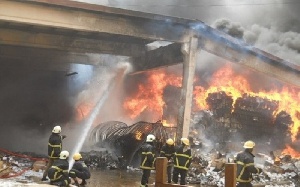 A photo of firefighters at the Makola Market during one of their fires
A photo of firefighters at the Makola Market during one of their fires
The market fire that gutted parts of the Kumasi Central Market on Wednesday, March 15, 2023, was not the biggest news of a market in Ghana being on fire, but it sure resurrected a recurrent conversation about these commercial places of trade.
The market, known as the Kejetia Market, had just experienced its second fire in a while, with the first having happened on May 11, 2021.
But fires in Ghana’s major markets have not entirely been a rarity but, unfortunately, a very common reoccurrence. In fact, it is almost an annual event.
The Ghana National Fire Service reported at the end of 2022 that it recorded 5,155 fire outbreaks from January to October of that year across the country, with 1961 being domestic fires and 17 being industrial fires.
And while there is no specified statistic on the number of fires that have gutted markets in the country, the GNFS places them under commercial fires. In 2022 alone, there were 986 such recorded fires, representing 14.51% of all infernos recorded in the year.
In the last two to three years—more so in the last two—GhanaWeb has reported on several fires that have swept through major markets in the country. The following are some of the headlines:
“Fire ravages Timber market in Accra.” “Mile 7 market gutted by fire,” “Tuesday morning fire destroys over 200 shops at Kantamanto,” “Fire sweeps through shops at Wa Central Market,” “Kaneshie market on fire,” “Fire destroys several stores in Tamale Market,” “Makola Shopping Mall gutted by fire,” “Fire rages Mallam Attah market,” among others.
In many of these cases, the GNFS has not always publicly published reports on its findings from these markets to help the public appreciate the causes and effects of these fires.
But in the case of the most recent fire at the Kejetia Market, GhanaWeb received a report conducted and submitted in 2022. The report focused on the entire Kumasi Central Market and the complete and proper operation of the market.
Among the findings are issues such as damaged valves, unbalanced pipes, non-operational CCTVs, and faulty gas leak detection systems.
The findings from the Kejetia Market may just be similar to a number of other markets across the country, although there is no publicly shared evidence to that effect.
Also, in most cases of fires at these markets in the country, preliminary findings have found such causes as unattended activities like cooking, faulty electrical connections, and improperly disposed cigarette butts, among many others.
The overcrowding in many of these major markets also makes it difficult for first responders to easily get in there to put out fires when they happen. In some cases, fire hydrants that were supposed to help firefighters put out fires in such locations have been buried by these traders as they take over every inch of space in these locations.
The issues are recurrent, and for most of them, they are very avoidable. So what exactly are the government and state authorities doing to ensure that these repeated damages and losses of property are a thing of the past?
These questions are important because, in many of these instances, all that the authorities have done has been to give assurances of support and state their determination to get to the root of these issues, but as has been seen many times, it all amounts to almost no action.
Based on the Kumasi Central Market Phase 1: Routine Inspection of Kumasi Market Phase 1 Operation report, the Kejetia Market could be a ticking timebomb. The same could be said about a lot of the markets in this country.
If there is a need for proper and sustained education in these markets so that traders are made more aware of the need to be safe in their commercial business environments, then more is needed.
And again, what is the role of the district assemblies in all of this? How effectively have they tackled these concerns? Answers are needed to arrest this completely avoidable recurrence, and the time to wake up is now.
You can also watch this episode of People & Places here:
Meanwhile, catch up on the concluding part of Francis Addai-Nimoh's interview on GhanaWeb TV below: